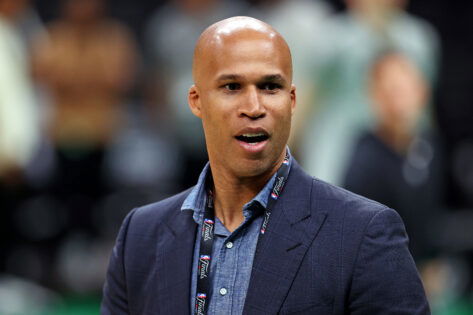

Richard Jefferson, the former NBA champion and current ESPN analyst, didn't mince words following the Oklahoma City Thunder's dominant comeback victory over the Indiana Pacers in Game 2 of the NBA Finals. Jefferson, known for his candid commentary, declared a metaphorical "time of death" for the Pacers' championship hopes, a statement that reverberated across social media and ignited debate among basketball fans.
The context for Jefferson's pronouncement stems from the Pacers' Game 2 performance. After stealing Game 1 in Oklahoma City with a last-second shot from Tyrese Haliburton, Indiana looked poised to take a commanding 2-0 lead as the series shifted back to their home court. However, the Thunder had other plans. Shai Gilgeous-Alexander led a ferocious offensive attack, and the Thunder's defense stifled the Pacers' typically potent offense. The result was a decisive Thunder victory, evening the series at 1-1 and swinging the momentum firmly in their favor.
Jefferson's "time of death" comment, while seemingly harsh, reflects the shifting narrative surrounding the series. Prior to Game 1, many analysts, including Jefferson himself, viewed the Thunder as the favorites, citing their superior talent and home-court advantage. The Pacers' Game 1 win was seen as an upset, a testament to their resilience and Haliburton's clutch performance. However, the Thunder's response in Game 2 demonstrated their championship mettle and exposed some of the Pacers' vulnerabilities.
Specifically, Jefferson pointed to the Pacers' inability to sustain their offensive production throughout Game 2. Haliburton, who had been sensational in Game 1, struggled to find his rhythm against the Thunder's tighter defense. Other key players, such as Pascal Siakam and Myles Turner, also failed to make a significant impact, leaving the Pacers' offense stagnant and predictable.
Furthermore, Jefferson criticized the Pacers' defensive effort, noting their inability to contain Gilgeous-Alexander and the Thunder's other offensive weapons. The Thunder repeatedly penetrated the Pacers' defense, generating easy baskets and open looks from beyond the arc. Jefferson argued that the Pacers' defensive lapses were a sign of fatigue and a lack of focus, suggesting that they were ill-prepared for the Thunder's intensity.
While Jefferson's "time of death" comment may seem premature, it underscores the magnitude of the Pacers' challenge as they head back to Oklahoma City for Games 3 and 4. To reclaim control of the series, the Pacers will need to make significant adjustments on both ends of the court. They must find ways to generate consistent offense, particularly from Haliburton, and they must tighten their defense to contain the Thunder's potent attack.
However, some argue that Jefferson's statement is an overreaction to a single game. The Pacers have demonstrated remarkable resilience throughout the playoffs, overcoming adversity and defying expectations at every turn. They have a proven track record of bouncing back from losses, and they possess the talent and coaching to make this a long and competitive series. Moreover, Tyrese Haliburton has shown the ability to perform under pressure, even after facing criticism. Following comments from Jefferson during Game 1 about Haliburton's inconsistency, Haliburton went on to make the game winning shot.
Ultimately, whether Jefferson's "time of death" pronouncement proves to be accurate remains to be seen. The NBA Finals are a marathon, not a sprint, and the Pacers still have ample opportunity to prove their championship mettle. However, they must heed Jefferson's warning and address their shortcomings if they hope to overcome the Thunder and capture their first NBA title. The Pacers lost game 2 with a final score of 123-107.